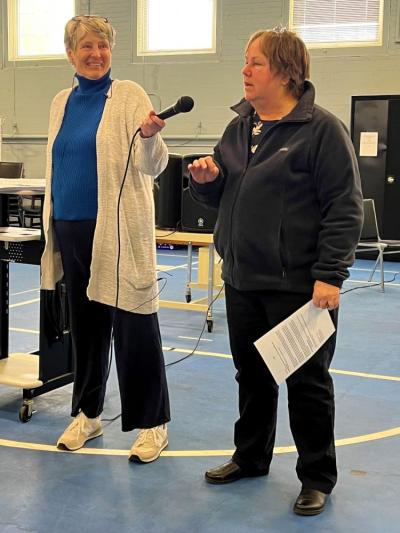Whiteside talks Decas, taxes at COA Q&A
Select Board Chair Judith Whiteside calls herself “a senior and then some.”
Speaking at the Council on Aging on Wednesday, March 8, Whiteside said that her multiple recent hip surgeries, which required her to spend some time in a wheelchair, gave her a greater understanding of the challenges that older adults go through.
“I came to appreciate things like accessibility much more than I got to appreciate them before,” she said.
Whiteside gave updates on ongoing issues affecting older residents, such as the proposed shuffling of town buildings that would move the Council on Aging from the Multi-Service Center to the Decas school building. She described the town as navigating a tightrope between providing necessary services and keeping taxes low, especially for older residents with deep Wareham roots.
“How do I keep this town affordable for those of you who live there?” She said. “How does the town do that? Do we want to be Nantucket, where nobody who grew up there can live there? I don’t think that’s fair.”
Whiteside said that the move to Decas is “in the air” due to the town’s current “financial problems.”
At the same time that the town is looking to shuffle its buildings, which could cost anywhere between $45 million and $49 million, it also plans to borrow $36 million from a state loan program to repair the outdated sewer plant.
For every $1 million the town takes out in bonds, Whiteside said, local residents’ tax bills will increase an average of $77.
“So multiply 36 times 77,” Whiteside said to gasps from the audience. “Do 49 times 77. Does that make economic sense today? No.”
Town Assessor Jacqui Nichols explained that contrary to popular belief, Proposition 2 ½ only prevents the amount of money the town can raise from increasing more than 2.5% each year. There is no cap on how much the tax bills themselves can increase, as long as the total amount the town raises stays below 2.5%.
Whiteside said that the town is looking at one-story buildings besides Decas that could house the Council on Aging. It would be wrong, she said, to make Wareham’s older population use a property that might not be a good fit for them.
Whiteside also touted opportunities for older residents, such as the Senior Citizen Tax Work-Off Program.
In this program, homeowners can “work off” their taxes by doing volunteer work for the town, getting paid $15 an hour.
“That money automatically comes off your tax bill,” Whiteside said. “Which is awesome.”
The program also provides town offices with much-needed additional staffing.
However, the 1,100 Wareham residents who live in mobile homes are ineligible for the program because they do not own their homes. People who live in mobile homes pay excise taxes, not real estate taxes. The owners of the mobile home parks are the ones who pay real estate taxes.
A proposed law to classify mobile homes as affordable housing passed Town Meeting two years in a row, but died in the state legislature.
On a more positive note, Whiteside called attention to the fact that, for the first time, the Council on Aging has a full-time director and outreach coordinator.
“Those are positions that were not available to you a year ago,” she said. “The town is making an effort to provide individuals to provide services to you.”
While next year’s budget is “not set in stone,” Whiteside said, salaries for the director and outreach coordinator will be included in it.












